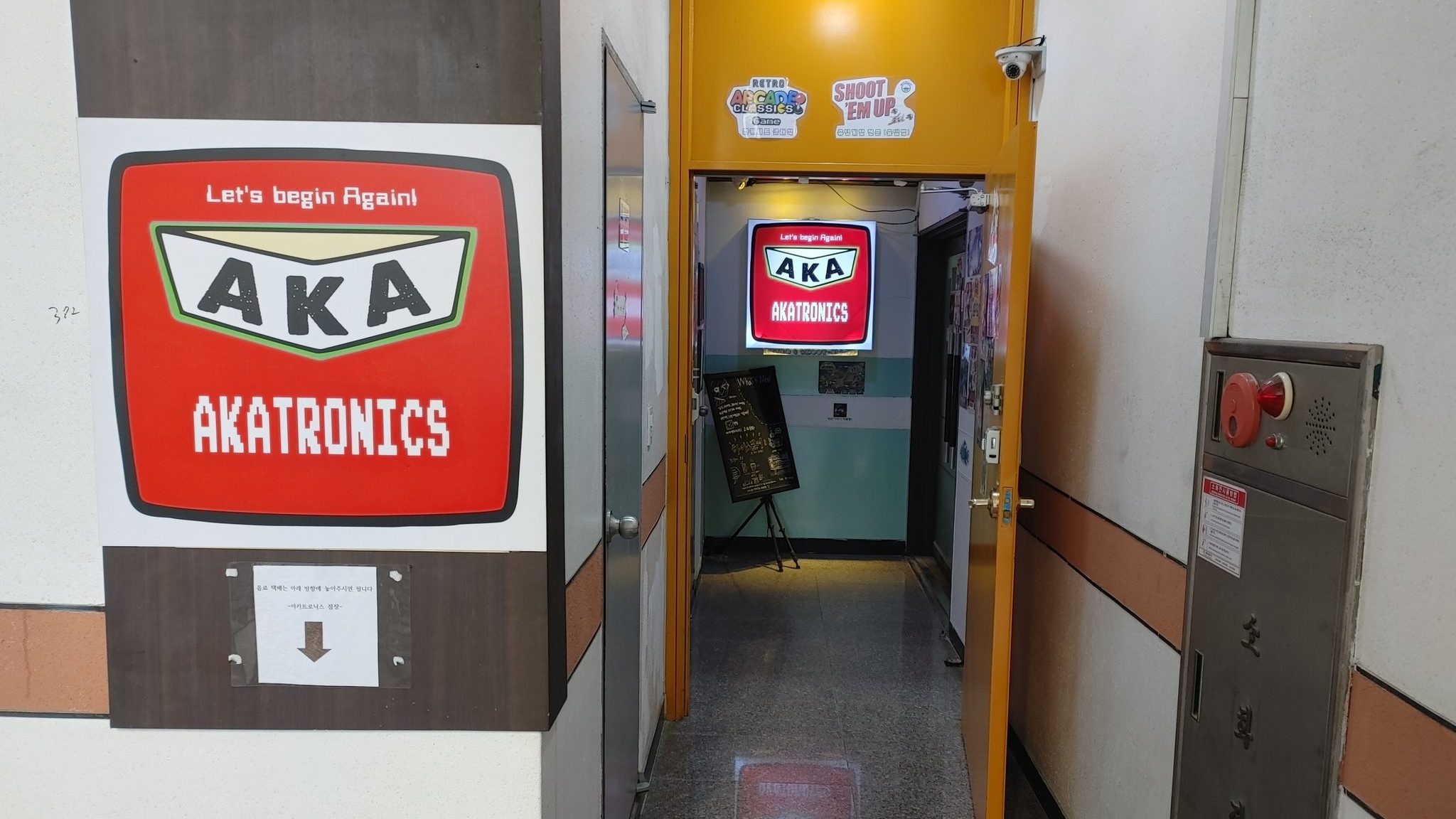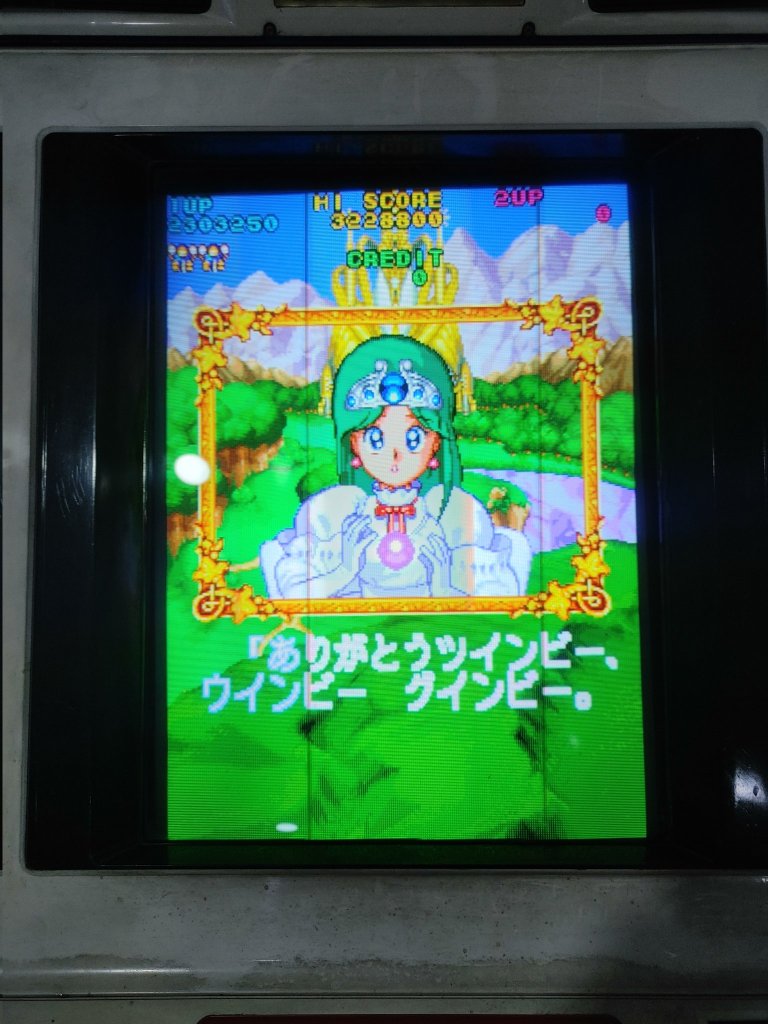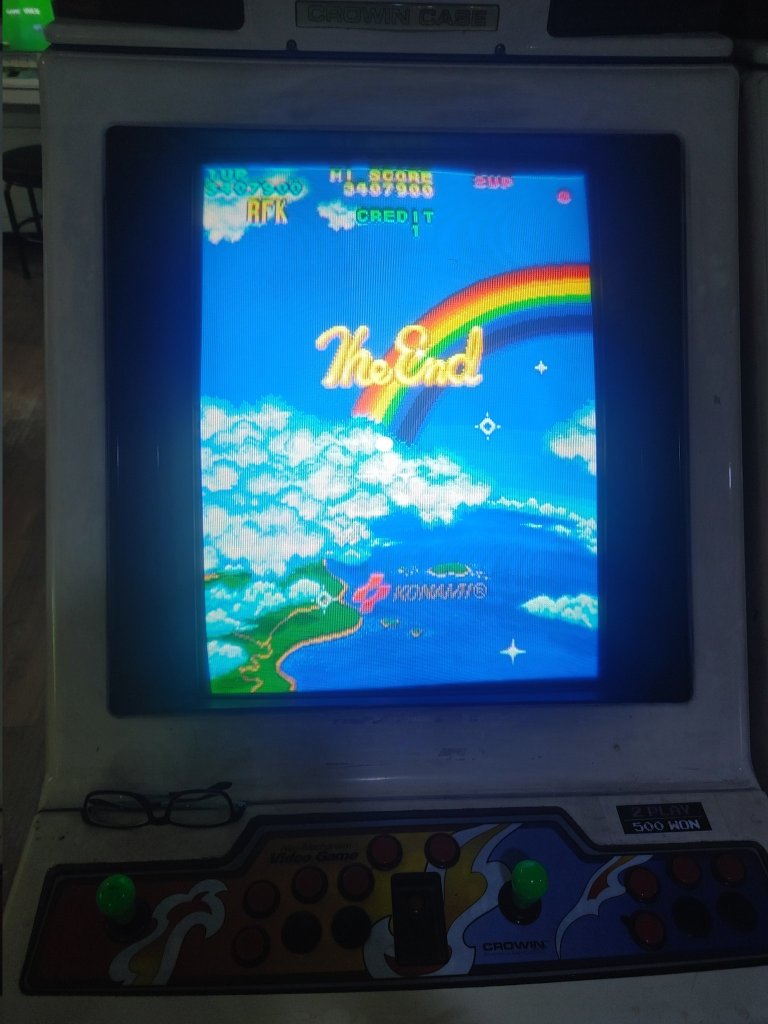
Refkey plays Detana Twinbee, notoriously one of the hardest shmups Konami ever made. In this interview we talk about healthy mindset for beating a 2-loop game, the differences between Cave and Konami, and treating failures as funny.
CAT: You seem especially interested in Detana Twinbee and Gradius 3. Is there something special about this era of Konami?
RFK: A lot of it has to do with how it feels playing the game. I’ve played several Cave games in the past. My impression is that 1-ALLs are doable without even having to memorize routes and practice. However, many games with 2-ALL difficulty, whether Cave or Psikyo or otherwise—any game that revolves around saving consumable resources such as bombs and lives to tank out hard bosses tends to make players reset the game.
This personally killed a lot of interest for that genre. Konami is a bit different. Power up mechanics exist but those are permanent as long as you don’t lose your life. Many claim that this era of games is not fair because of harder to recover check points. However, there’s a sense of utilizing overpowered options while fully powered up. And if I happen to lose a life, there’s a sense of improvisation that I can pull off. This improvisation isn’t really consistent, of course. But the thrill is there.
CAT: Hm… so even though some might say “Detana Twinbee and Gradius 3 are the hardest of the hard,” you can power through large parts of the game with a fully upgraded ship. Whereas with Cave you get gradually worn down until you don’t have enough resources for the true last boss. In Konami you “gain and keep” while in Cave you “try to lose slowly.”
RFK: Yeah, that’s generally how I feel. Also, “inconsistent” improvisation is the best part, especially with Detana Twinbee. Whether you lose a life or remain fully powered, there are a lot of moments where you have to try different behavior because there are more variables to enemy movement.
I think you could do this in other games as long as your routes and execution are solid enough. But you would still probably reset a ton because at that point you want score and a personal best. Not so much with survival play.
CAT: That lines up with how I felt about Gradius 2 on PC-Engine. It felt very good to power up the ship, and once I was at full power I felt like I could set the Vic Viper to cruise control. Until something bad happened—then it was a scramble to recover. Recovery wasn’t impossible, and it was quite fun. I was surprised that I could recover on the Moai stage, for instance.
That’s the impression I get of Detana Twinbee. With Cave you have to do things the Cave way, dealing with their bullet patterns. I see Detana and I think “this game is kind of zany.” There are more controlled shmups and then there are shmups where you are reacting to the game’s wildness.
RFK: I still do think you need strong routing for these games as well. The only real difference is that your route will not work at some moments, so you sorta predict and make decisions around them.
In Detana Twinbee specifically you have only three lives and no score extends at all. Meaning you would want to survive as best you can. I’ve 2-ALLed the game 13 times at this point, and the game still gives me a heart-pumping experience, especially when I get to the later part of the game.
CAT: How long have you been playing Detana Twinbee? How did you start playing it?
RFK: Probably a year and eight months. In terms of hours… it’s a bit hard to say. More than 400 hours at this point.
My first impression was that the game was a bit difficult even for the first loop. I watched several replays and paid attention to maneuvering the bells using charge shot. I got used to the game more quickly than I expected for the 1-ALL. The 2-ALL was different. At that point, I had to sit down and figure out how the tail barrier works. I was getting a general sense of the game. But I still needed a ton of work to make the run more consistent.
CAT: Were you already skilled in shmups before playing Detana Twinbee?
RFK: I did play non-Konami shmups before Detana Twinbee. I reached Omote loop 2-2 in Ketsui, cleared Futari 1.5 Maniac, Battle Garegga with Golden Bat, Darius Gaiden Z route, and others. I don’t know if I would say I was skilled at the genre, but obviously speaking I didn’t really play any novice modes back then.
I picked up Detana Twinbee right after I did the 1-ALL in Gradius 3. The famous shmup difficulty wiki list did get me curious about the game. Funny thing is, I wasn’t able to find any 2-ALL replays on English Youtube channels. I’ve only seen a few 2-ALLs by Japanese players like Jibyuan, Koizumi, and TZW. I’d hear people say, “Hey, nobody internationally has done a Detana Twinbee 2-ALL, I’m gonna do the first 2-ALL!” But none have ever done it since then. So I played the game for myself and it gave me more excitement than ever. I immersed myself into it well and eventually got the 2-ALL for myself at the end of 2021.
CAT: How did you feel that day—when you finally got the Detana Twinbee 2-ALL?
RFK: Short answer is: Happiest day ever.
The longer answer is that I no longer had to worry about anything anymore. I could just enjoy the game. I reached my goal, and now I could continue to enjoy the game.
CAT: So for you it was a natural progression, then. I was under the impression that you jumped straight into Detana Twinbee the same way Kayar jumped into Dodonpachi Saidaioujou. But it seems that after Gradius 3, this was the obvious next thing to try. And you liked it so much you kept playing.
A lot of more novice players are beating their head against the wall and bouncing from game to game. Maybe they’re not entirely sure what practice looks like. I realize I can’t tell anyone “here is how YOU could 2-ALL Detana Twinbee.” But maybe it would help them if you talked about your practice. How did you approach Detana Twinbee?
RFK: The biggest thing I have to say is… practice is one thing. But before that I think “mental health” or some kind of attitude is what you would need to take care of. I’ve seen tons of people wanting to 1CC many games for many reasons: impressing fellow players, feeling the thrill of overcoming difficult challenges, or just satisfying themselves.
In my case, I knew that going for Detana Twinbee right after Gradius 3 is still going to be a huge leap. Not just because of its infamous difficulty, but because these are very different games even though they’re both developed by Konami.
So here’s the punchline. Set your expectations lower and start respecting the game, rather than thinking “I can do this in X months.” Taking more time is always okay. If you need a break, don’t force yourself into getting even more frustrated. Once you’ve sorted your mindset out, then start practicing.
In terms of practice method, I’ve tried as many resources as I can. Try to access as many replays as you can on Youtube or any other platform. Watch as many as possible. Even your replays. The point isn’t to replicate exactly world record tier runs, but rather to understand their situation.
Then you break up your practice using save states or training modes. Unfortunately, ACA Detana Twinbee [ACA Bells and Whistles in US] doesn’t have a training mode. So I created several accounts to make save points where I usually struggle.
I do practice routes for certain segments but I don’t grind them. My practice is similar to how you practiced Mushihimesama Futari 1.5. I will play some of the saved parts where I usually struggle and try to connect the route all the way to the end. There was a time I struggled with 2-3, so I started at 2-3 and tried to clear from there. This type of practice is usually done at home.
When I visit Akatronics game center, I play the whole game to see if I can connect everything. And of course this whole connection will not happen in a day or two. And this is where you watch your replay. See what kind of mistakes you have made, and try to come up with new theories to nullify that same issue happening.
For that first time 2-ALLing the game, my gameplay wasn’t even stabilized on 2-2. But even after that I didn’t grind the game. Instead I played the game regularly. After a year from that point, I’m playing reliably up to 2-3 and working on stabilizing 2-4 and onward.
So in a nutshell: make some saves and practice segments at home to lab strategies. Then try to apply that during the full run at the arcade.
Like I said, don’t grind. Instead try to give yourself time to “forget” what you learned today—on purpose. You’ll forget small details no matter how long you grind per day. The big focus here is to figure out “what you really forgot,” and relearn it again so you get to remember how to play the segment more naturally than ever.
There were times I forgot how to play 2-2 and 2-3 due to a long break. That was really the point. I wanted to forget as much as I could and relearn it again and again. At a certain point I simply cannot forget anymore. This process may not be time efficient. But it is much less stressful than grinding every day and expecting higher and higher rewards from your effort.
The easiest way to forget as much as I can is to only visit the game center once a week, and play home practice for a couple of days. The key here is consistency of play schedule. Taking a break is good, but if that break is inconsistent you may lose interest in the game.
I brought this up because some people are too afraid of forgetting what they’ve learned. But I would say continue to be natural about it. So yeah… a lot more about mental management that practice method, isn’t it?
CAT: Well that’s definitely important though. Like, you’ve come back to Detana Twinbee for 1 year and 8 months even though it’s difficult. Many players will get themselves frustrated because they can’t 1CC in a week. “What’s wrong with me? I’m so bad at these games.”
Moglar is obviously a very strong player. He was a strong player before he began playing shmups… but even he played Ketsui for 2000+ hours. I haven’t played any shmup for that long.
Consistency of practice is half the work of practice. Maybe there are “better” ways to approach games, but in the end just continuing to play a certain game is the most important thing to do.
Organized forgetting though—I’m very surprised to hear that someone else is doing that.
RFK: Yeah, Moglar is definitely another level. He is going for world record tier in a game where in depth optimization is very important. Kayar and Gus are the same in that regard.
CAT: Right. Maybe that requires a very different mindset. The “this is just what I do and it doesn’t matter if I like it” mindset. Possibly that can arise naturally out of a mindset like yours. I’m not sure. Maybe “it’s important to just come back and practice” morphs into a habit morphs into “this is just what I do.”
RFK: The thing is, I’m not all that interested in scoring in video games. Surprisingly speaking.
Well, I do kinda want to make personal bests and stuff. Unlike people like Moglar, Kayar, H.J., and Gus, I still try to play the run as much as I can without resetting games again and again.
As for the mindset you described, yeah, I don’t think anyone can replicate how I approach the game. But at the same time I cannot do the same for others. For example, there are people who love to quickly grab 1CCs and such… but I simply cannot try hard to grab 1CCs as quickly as possible because that’s just too stressful for me.
And this is where “everyone is different” comes in.
CAT: Absolutely. There are maybe some “best” ways to practice—or maybe not? But if the “best way to practice” is one that drives you nuts, you’re not going to do it, and it’ll be the worst way to practice.
RFK: I don’t know how I did it. But really setting expectations lower helped me in a lot of ways. Not just “I will take some time” mentality, but also, I get to laugh a lot even if I lost the game. There’s a sense of feeling “funny” when losing in a game instead of “painful” and “stressful.”
I dunno if any of this makes sense to you though. Even I don’t understand this sometimes. It’s just like playing Gradius 3. Very hard and unfair but still gives me a good laugh at the end.
CAT: For sure. There’s not much to be gained from getting mad at the game, and much to be lost from saying “That was a stupid mistake. I’m an idiot. I’ll never get this.” Probably much healthier to laugh and say “it’s funny how that happened.”
Some people may not be able to control that… they may be in a habit of blaming themselves for everything. That sort of psychology can be very hard to pull yourself out of, I’m sure.
To some extent that may also have something to do with Gradius 3 and Detana Twinbee. Earlier we were talking about “controlled” Cave games versus “zany” Konami games. I see on Twitter people post videos of the cube rush in Gradius 3 and I get the impression that it is a very funny part of the game. Even when they die to the cubes, players seem to have a sense of “Can you believe what the cubes just did to me?” The difficulty is so steep and unpredictable you almost have to laugh.
But then you have a Cave game, which while they do have random elements, there’s a sense of them being a very controlled game. So if the game is very much under control, it must be the player who needs to control themselves. Nobody really has full control of their body, and if you add in the game there’s even less control. But it feels like you should have been able to do it, so when you fail it feels like completely your mistake.
I play Super Mario Kart Battle Course 2 with my gradeschool friend whenever he’s in town. That is a very unpredictable game. It seems whenever we play that game, we have to laugh about something. Even after years, we still say “Did you see that? Can you believe what happened with that red shell?” More recent Mario Kart games still have a sense of randomness, but that’s not what I mean. Super Mario Kart has such an unpredictability and a sort of “aliveness,” that it still manages to surprise us how the red shell circled once, twice, and then managed to chase around the corner. Even if we’re heading straight at each other in the open center for a red shell duel, we don’t know what will happen.
While I was playing Futari for so long, I would look at your posts about Detana Twinbee and say “Now this is a very different game. This is a game I want to play.” Futari is very under control, very perfectionist, but Detana Twinbee seems very zany, surprising, and alive.
RFK: It seems like you understand this concept more than I do.
But yeah, this whole sense of “unpredictable” is the strength and weakness. It gives you the sense you are trying to go on hard reads on games, and if that succeeded it becomes a very satisfying experience and if not it becomes funny entertainment. The weakness is not everyone will be able to comprehend the silliness and absurdity of its nature.
When I get to play Futari 1.5 Abnormal Reco, it definitely didn’t give me the sense of “unpredictableness” and improvising things on the fly. It’s what you’ve described so far. The game is “specific” and “perfectionist.”
But at the same time I still set my expectation lower so I don’t blame myself too much and don’t take it too seriously.
CAT: Do you feel that Detana Twinbee is misunderstood or underplayed?
RFK: Both, obviously. It’s generally underplayed, but those who played the game haven’t gone in depth. Even in Japan right now you would see a ton of Gradius 3 players around, but for Detana you would only see very few including me.



Leave a comment